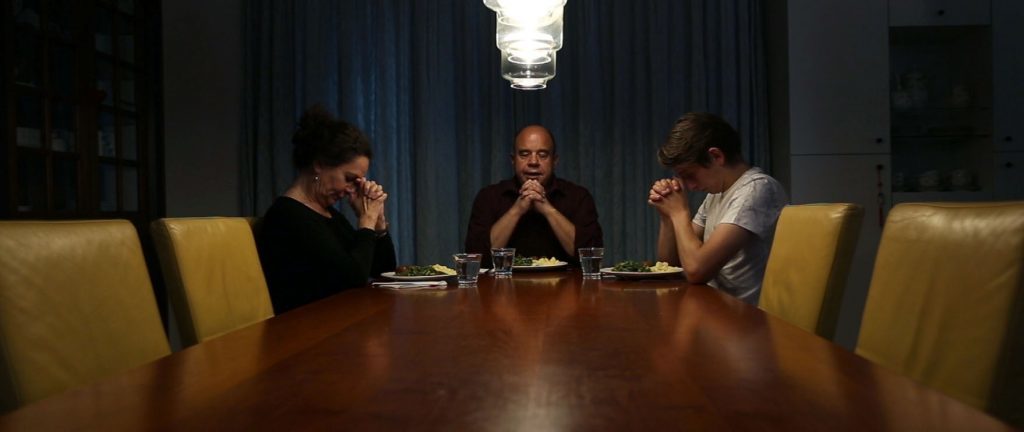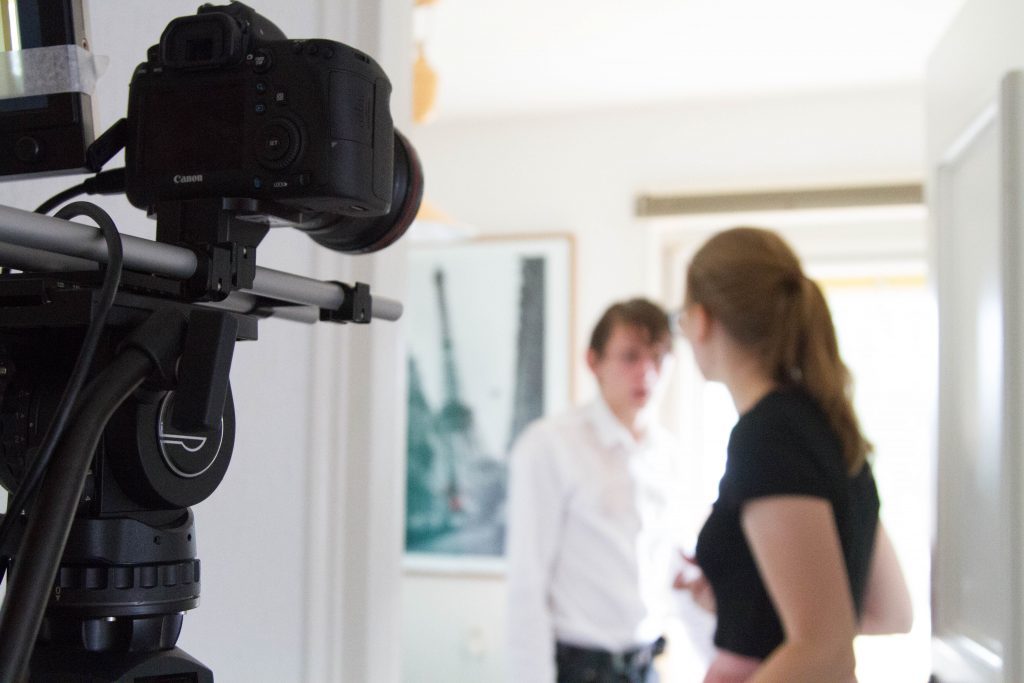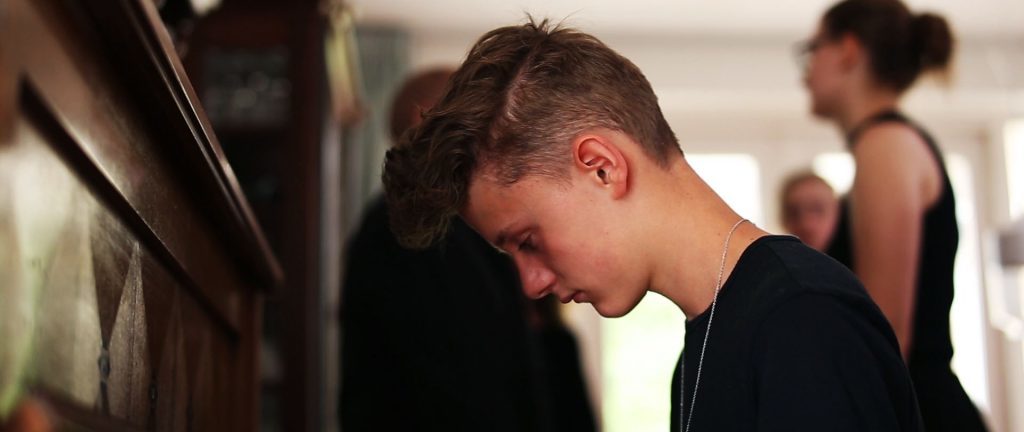
Case Study: Closed Doors
An insight in the making of the short film Closed Doors (Gesloten Deuren)
Geplaatst op 18 december 2017The director and script writer for ‘Closed Doors’ (Gesloten Deuren) was Sanne Walet, 4th year film and photography student at MAMDT. She wanted to create a movie that shows the complexity of truth and how people can have different ideas about what happened. Since the movie is about the loss of a brother/son it also shows how different views can affect the way people grief. The script was written for a class under the guidance of Jan Salden. After the class ended, Sanne continued to work on the script, eventually taking a little less than a year to finish it completely.
“Just go for it, don’t wait for the right moment, but make it the right moment.”
What can you tell us about the process of making this movie?
“We ended up shooting the 9th version of the script. Of course during shooting we still changed some things and in editing we even threw out the structure of the script and changed it. A good example is that the script was written as a fall movie, but we ended up filming it in spring. The first shooting day it was 30 degrees so we couldn’t exactly believably make it look like it was fall . Around the 6th version of the script, the director started with the storyboard. This was then used by our storyboard artist to create the final storyboard. The storyboard was then used on set so the DOP’s knew exactly what to do. The storyboard artist was Emma-Lee Snell and the DOP’s were Rowena Golob and Iris Dreesen. Working with two DOP’s was a choice of the director, to emphasize on the difference between present and past. Rowena filmed the present scenes which were mostly static shots. Iris then filmed the past scenes which were mostly handheld shots.”

Where did you find the crew for your film?
“We found most of our crew among our friends, family and classmates. The film was produced by the director’s sister Lauren Walet, 2nd year student International Media and Entertainment Management at InHolland The Hague. Their younger brother Sam Walet also ended up working on the set as a runner. The DOPs, gaffers, sound recorders and more were all students from the same school as the director. The only crewmember we couldn’t find in our own network was a color grader. So we contacted CineSud to see if they might know someone. That’s how we found Rico Derks.”
And where did you find your cast?
“For the cast we went to Laagland Theater to scout for the roles of Milan and young Jasper. We ended up casting Thomas Baselmans as young Jasper and Morris Thole as Milan. With their background in theater it was a pleasure to work with them. For the main role of Jasper we contacted the Theater Academie Maastricht and there we found Reno van Rijsewijk. Working with him was great. He was really good at tapping into the right emotions. One time on set he even cried on command. For the roles of the parents we contacted Huis van de Kunsten Limburg. Through them we found Hans Kiggen who plays the father. Aside from that we placed some casting calls on facebook. There we found Thea Fleuren who plays the mother.”

How did the shoot go?
“We shot 5 days, which turned out was not enough days to fully capture everything but we made the best of it. The atmosphere on the set was really nice. We had a lot of fun filming. There were some scenes we didn’t think through completely before shooting. The rain scenes are a good example of complete improvisation. It wasn’t raining that day, so we needed to find out how we could create fake rain. We ended up using a garden sprinkler and a lot of umbrellas to keep the equipment dry. As the actor had to be dry in the first shot, and we were with a very small crew at the time, the director had to be testperson for the rain. The assistant director had a lot of fun controlling the sprinkler. We also had some night scenes for which we had to tape aluminium foil over all the windows to keep the light out. Since it was really warm that day, it became very hot in the house with everything taped shut.”
How did you handle the post-production?
“The edit was done by Eva Plompen, 3rd year student montage at the Netherlands Film Academy. She was very busy around the time, but we were able to work with her as she and the director had been friend since high school. Through her we also found our production designer, sound designer and title designer. The editor and the director planned a couple weeks in the summer to work on the edit. At first it didn’t go very well, because the original structure didn’t work the way we wanted to. We decided to get some post-its and write down all the scenes. Then we started reorganising the scenes and made many different versions. Eventually we found a version that worked. One important lesson we learned is that time on set can feel very different than real time. Some of the material felt very rushed, but Eva used some editing tricks to make it all feel less rushed.
When we had the picture locked, it was sent to the composers and the sound designer. The sound designer was Andrea de Jonge, 3rd year student sound designer at the Netherlands Film Academy. The composers were Frederik Tings and Kavour S. Christos. Frederik has his background in Jazz and Kavour in classic music, so it was very interesting to see what they would create together. They created interesting music for the movie. Certain pieces were perfect the first version, others had some revisions. After all the music was done and the sound design finished the editor created the final exports of the movie.”

How did you distribute the film?
“The film made its premiere at the SHIFT Film Festival in Maastricht. Currently the film is being sent to some festivals. In Januari we’ll be hearing back from the first festival. On the 19th of december we’ll be having a double première, together with the short film ‘Verlicht’, which was directed by our assistant director Nelleke Broeze. We’re also looking into screenings in other cities. In the beginning of next year there will be a screening in The Hague. We’re also still looking to show the movie in Amersfoort, the hometown of the director and producer.”
What would your advice to other directors be?
“Our advice to other directors is just go for it, don’t wait for the right moment but make it the right moment. Also don’t be afraid to take on some production tasks because it will help the production. But when the shooting days come along you should focus on directing and directing only. Something we also learned during this production is that it’s better to take enough time to record everything. We had a very tight schedule for this film which cost us some of the details that were in the script.”